August Issue:
Previous Issue:
Popular Literature:
Graphic Novels:
LINKS to Other SITES:
Not On Rainy Days
Spider-Man Revisited
Akin
 The
Buddha Tree
The
Buddha Tree
Fumio Niwa (trans. by Kenneth Strong)
Rating:
The Buddha Tree can be called a religious tragedy as it tells of the sins of a Buddhist priest and the strange destruction of the woman he loves. But this description is misleading as the tale is much more than that. Niwa's style is meandering but well-thought out. His characters are all complex creatures and though the element of Buddhism is strong, it stays in the background. Kenneth Strong's translation is easy to read and imbued with emotion and power. This is a unique story in every sense of the word.
 |
 |
 |
 |
 |
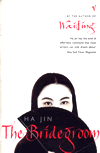 The
Bridegroom
The
Bridegroom
Ha Jin (Vintage International)
Rating: 
Ha jin writes plainly and effortlessly in this triumphant collection of
short stories of China at the turn of the century. The Bridegroom
unabashedly tackles sex, politics, prejudices, homosexuality and ideologies
with each story balancing pathos, humor and drama. Educational and entertaining.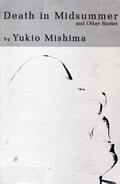 Death
in Midsummer and Other Stories
Death
in Midsummer and Other Stories
Yukio Mishima (trans. by various)
Rating:
Master storyteller Yukio Mishima discusses a variety of themes using different styles to accomplish this magnificent collection of sombre tales. This book encompasses a wide range of genres: comedy, romance, tragedy and contemporary. But the quality of his work never suffers (credit to the inspired translations by well-known professors Moss, Seidensticker and Keene). In all his stories, Mishima never forgets he is a Japanese and it shows.
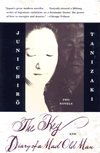 The
Key and Diary of a Mad Old Man
The
Key and Diary of a Mad Old Man
Junichiro Tanizaki (Vintage)
Rating: - The Key
- The Key
Rating: -Diary of a Mad Old Man
-Diary of a Mad Old Man
The Key is a complex tale between an "adulterous" wife, a perverted but pathetic husband, a harmless lover and a daughter who seemingly schemes over all of them. Tanizaki builds his story carefully and minutely catches the thoughts of his characters though the narrative does little to bring about a terrific or satisfactory climax. The Diary of a Mad Old Man is equally disappointing in its execution leaving many to wonder what the motives of the sexy niece Satsuki is in tempting the aged Utsugi. Moreover, a lengthy medical discussion about Utsugi's condition leaves many readers in the cold.
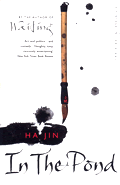 In
the Pond
In
the Pond
Ha Jin (Vintage International)
Rating:
Ha Jin vividly recalls the state of China during the post-Mao era as he accurately describes the lifestyle of the working class -- and the challenges they face. The main character is intelligent, talented but stubborn and impulsive as he does battle with Liu and Ma, who is as evil and tyrannical as Darth Vader. At times heroic and heartbreaking, the novel is a simple tale of the underdog trying to battle a country's system using whatever tools that is left to him.
 Code
of the Samurai
Code
of the Samurai
Taira Shigesuke (trans. Thomas Cleary)
Rating: 
Prolific translator Cleary somewhat makes up for his flimsy and ambiguous
translation of Five Circles with Code
of the Samurai. Cleary seems complacent as he leisurely offers
very little in this book. His text is often too contemporary, ignoring
any cultural or ethnic aspects of Japanese life. Unlike well-researched
books like Pillow Book, Code
is disappointing to say the least -- its value is found only in comparison
with the superior Hagakure.
 Snow
Country
Snow
Country
Yasunari Kawabata (trans. Edward Seidensticker)
Rating: 
Kawabata's masterpiece lacks the tension, complexity and tragedy of A Thousand Cranes. As before, many questions are left unanswered but this time Kawabata (or Seidensticker) leaves too much to the imagination. Still, Kawabata is a master of conversation and the scenes between the geisha Tomoko and the itinerant businessman is worth the price alone.
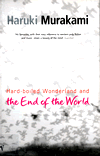 Hard-Boiled
Wonderland and the End of the World
Hard-Boiled
Wonderland and the End of the World
Haruki Murakami (trans. Alfred Birnbaum)
Rating: 
Contemporary writer Murakami's dual story is representative of Tokyo -- a mixture of both the callous superficiality of the West and the profound power of the East. This book is seemingly Western in style but in truth is more manga in prose. The plot is fairly simple enough but entertaining and profound at times. Murakami's style is very distracting as he lets his own opinions flow freely. His science fiction in HBWETW becomes farfetched midway through but admittedly quite clever. The resolution of his story is fitting and dramatic -- a finish that only an exceptional writer can pull off.